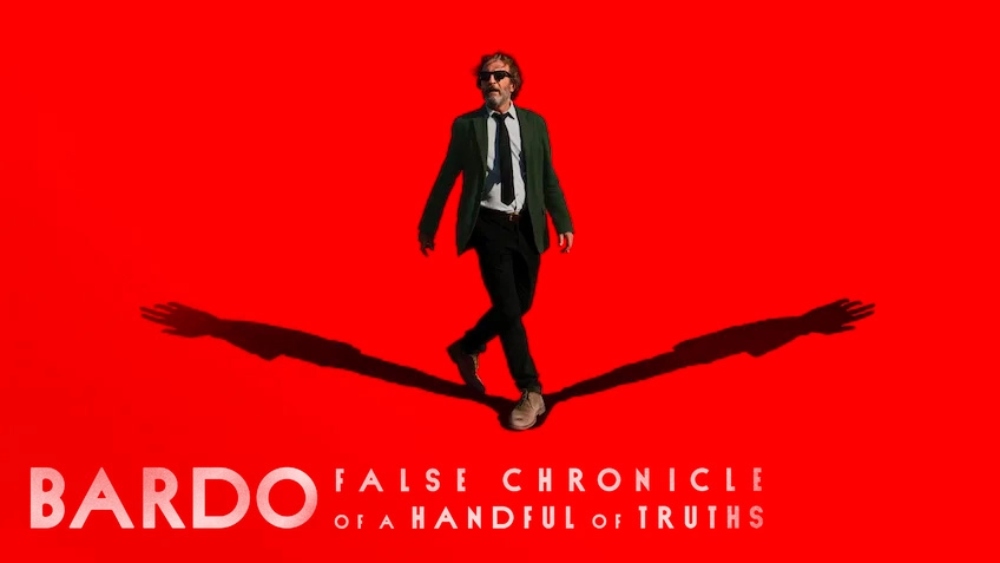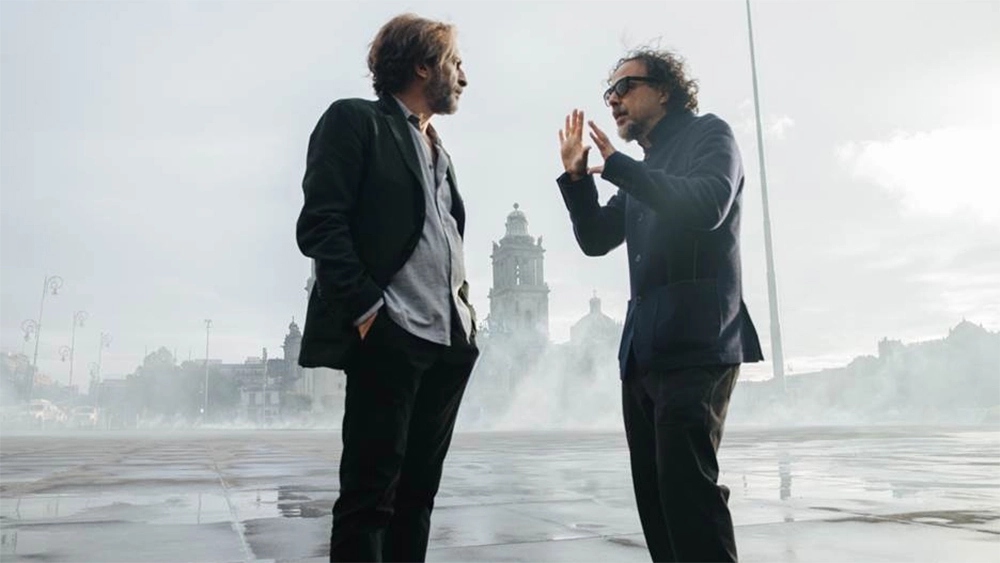
Kudos to director Alejandro González Iñárritu for bravely bucking the “90 minutes is too long to sit still” trend that defines our restless, unfocused generations. His new film Bardo (or False Chronicles of a Handful of Truths) — the title itself augurs length — screened this past week at both the Venice and Telluride Film Festivals, clocking in at a whopping 174 minutes, almost as if to say: “don’t @ me, bro.” But if Iñárritu wanted to show audiences the indisputable value in releasing oneself into a story of epic length, he hurt his own cause by including plainly unnecessary sequences that may show off the director’s undeniable aesthetic and the prowess of Darius Khondji‘s cinematography, but do not move his story along in any way. In the end, Bardo is a good film and a deeply personal one, though it’s kept short of being great by its own lofty ambitions.
The film opens with a desert montage. A man seems to be running, then flying, somewhere in the wastelands that surround the Mexico/U.S. border. Another dreamlike sequence follows, one involving the birth, or perhaps un-birth of a child. Next, we see what appears to be one more imagined moment involving some fish, a flood, and an overground metro line headed into downtown L.A. These interesting but abstract sequences slowly reveal our protagonist, Silverio Gama (Daniel Giménez Cacho), a filmmaker who unsubtly looks a lot like Iñárritu himself. Eventually, he wakes up from his bed and begins interacting with the maid, the agent, and the family members in his downtown Mexico City apartment, but the extended, ethereal intro is enough to (and meant to) put you on guard, unsure of the line between reality and fiction.
Eventually, we discover that Silverio is a successful journalist turned documentarian, who is on the cusp of becoming the first Mexican (Latin American, even) to receive a prestigious award in Los Angeles. As the story unfolds, we learn that he has chronicled the sufferings of migrant caravans, the corruption of Mexican governments, and the overreach and imperialism of American ones. Silverio emigrated from Mexico to Los Angeles more than 20 years ago with his wife, son, and daughter, and suffered the devastating loss of a third child many years ago. He carries with him a sense of guilt, longing, and ennui — guilt because he has become a rich capitalist pig after years of sounding off against the bourgeoise, Mexican income inequality, and American oppression; longing because he is getting older, his friends and parents are dead or dying and, like any Mexican immigrant in the United States, he misses his home country dearly; and ennui because, well, he is self-aware enough to know that, as Iñárritu’s bulky script explains in one of its many “too clever” moments, life is but a sequence of random, meaningless events.

Bardo is an ambitious, sprawling film, one that touches upon many different subjects and themes — all of them effectively. As the director described the movie ahead of its Telluride premiere, it is like a fabled Mexican soup called “pozole,” an amalgam of many ingredients that sound bizarre to be mixed in together but that taste good if warmed up properly. It is a deeply personal film, one that touches upon the director’s feelings about his own life but also the world (and countries) that surrounds him.
On a personal level, Bardo focuses on a series of ideas that are, to be fair, aggressively cliched in the context of a successful auteur of any kind. A reminiscence of childhood traumas, that crazy school teacher, that absent father, that sexual awakening. It is almost as if Iñárritu was determined to make his own, Mexican version of all of Paolo Sorrentino’s obnoxious and frustratingly self-indulgent movies, none of which ultimately have any merit beyond putting on screen the director’s own boundless obsession with himself. Those themes are Bardo’s weakest and least interesting elements by far. So too are the related ideas, ones that are not personal or unique to the director but that do appear over and over again in the work of self-involved writer-directors from Bob Fosse to Woody Allen: Was I good enough? Will my work endure? Did I sell out? Do I deserve this recognition? Did I become the kind of person I hate? Did I betray those I claimed to love? These moments, which steal at least half of the runtime, produce a collective “eh.”
Bardo is far more successful as world commentary, especially in those moments when Iñárritu explores themes and histories of Mexico that do not frequently find their way into Hollywood productions. He begins with a reference to and a parody rendition of a well-known grade school story that Mexican school children hear, about six “Boy Heroes” that acted valiantly in their futile defense of Chapultepec Castle during the Mexican-American War in 1848. Silverio has an encounter with the fat, cocky, cackling American ambassador at this historic site, where Silverio airs the sesquicentennial grievance that Mexicans still have with the loss of half of our territory back then and that 99 percent of Americans, even and especially those who otherwise claim to have “modern values” such as returning lands to their original inhabitants, are blissfully unaware of. (Indeed, a travel companion asked me why all the town, park, and county names in Colorado, where Telluride is located, are in Spanish. Really?)

Silverio later explores Mexico’s complicated history with the Spanish Conquest led by Hernan Cortes and the birth of the Mexican people as the product of rape, pillage, and plunder. The script borrows heavily from the ideas of Mexican Nobel Laureate Octavio Paz, to convey the notion that Mexicans will never rest fully easily as a people knowing this disturbing origin, while simultaneously being proud of our unique history and heritage. Iñárritu, through Silverio, also explores modern-day violence in the Mexican state, the pervasive and odious income inequality in the country (buoyed and encouraged by American capitalist patrons), and the different perspective of a rich, privileged Mexican immigrant into the United States — a story that is rarely told or explored — and how it’s similar to but still quite different than that of a poor, marginalized immigrant. When Bardo explores these ideas, it is on point, and even brilliant, with the director using his enlarged international recognition to add another layer to the growing facets of modern Mexican culture that our country’s stunning, 21st Century cinematic rebirth has augured.
Still, Bardo suffers from a perennial problem with filmmakers who are so openly dedicated and unspeakably dazzling as Iñárritu — trying to do too much in too little time. It’s not that he doesn’t explore the themes well — he does. But, on top of all of the foregoing, Iñárritu is also trying to visually dazzle you with confusing, surreal sequences, with cameras that cut from one improbable scene to another, shot in a rambling style that evokes Birdman. It is effective, sure, but fairly unnecessary. Extended desert sequences, long rides on an empty metro, and five minutes to climb a pile of admittedly well-produced sets of naked dead bodies will make you wish that Iñárritu had been more disciplined and focused if only to keep you more engaged with the themes at hand. Perhaps a smarter critic could unpack the value of those montages beyond their aesthetic values. For this one, Bardo shone superbly when it was discussing new ideas that resonate rather than when it was busy showing off its cinematic parlor tricks.
When the story of Mexican cinema’s rebirth is told years down the line, Alejandro González Iñárritu will be prominently featured. His two directing Oscars will loom large, but it was Amores Perros that put the country back on the cinematic map, where Bardo has also reserved a spot. Not necessarily because it is as everlasting as some of the country’s other classic films, but because it convincingly tells a story that only a handful of people are able to do — this successful, emigrated director being one of them.
Grade: B
Bardo premiered at the Venice Film Festival on Aug. 31 and will be released by in U.S. theaters on Nov. 18 by Netflix, where the film will begin streaming on Dec. 16.





